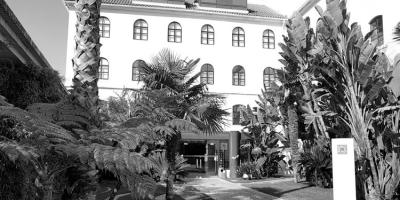Don’t miss an opportunity! Link up with us to receive updates as they happen.
Title
Visiting fellows at the HCTS during the summer semester
Date:
Date:
Dr. Manuela Ciotti, associate professor at the School of Culture and Society, Aarhus University, Denmark, was present at the HCTS from June 17 to 26. As a visiting lecturer invited by the professorship of Global Art History, she gave a guest lecture about “Staging the contemporary in the Global South: The art-architecture-archeology-heritage complex at the Kochi-Muziris Biennale (KMB)”. The talk was of the lecture "Narrating Worldliness II: The Global Contemporary", held by Prof. Monica Juneja in the summer term 2019. Ciotti is currently working on a project titled "Modern and contemporary Indian art and the global: Culture, capital, and the development of post-colonial taste" in the context of a fellowship awarded by Indiana University. It is a large-scale project on global presences of contemporary art from India which centers on major contemporary art-related events.
From June 5 to 15,
Prof. Arunava Dasgupta was at the HCTS as an Erasmus+ fellow with the professorship of Visual and Media Anthropolgy. He is an architect and urban designer currently engaged as head of the Department of Urban Design at the
School of Planning and Architecture in New Delhi. As a founding member and former secretary of the
Institute of Urban Designers – India (IUDI), he has been actively promoting the idea of holistic urban design, while creating alternative development frameworks using community participation as a central tool for local area design. He was hosted by the professorship of Visual and Media Anthropology and taught a class and organized a workshop in close cooperation for the seminar Collecting, Mapping, Archiving and Exhibiting, in which he will share his knowledge and critiques of mapping the city. He tought a class on the “brittle Indian city” for the course Urban Matters by Prof. Christiane Brosius. Prof. Dasgupta’s visit was made possible through a Mobility scholarship by the
Erasmus+ programme SWAGATA.
Prof. Jun Fujii will stay the HCTS for a full year as a Humbold Fellow. Hosted by Prof. Michael Radich, professor for Buddhist Studies, his stay is made possible by the Alexander von Humboldt Foundation. Prof. Fujii Jun is associate professor for Buddhist Studies at Komazawa University in Tokyo. His research explores Japanese Buddhism, in particular the thinking of the Buddhist monk Kūkai, about which he wrote one of the most important publications.
By the invitation of the professorship of Cultural Economic History,
Dr. Sarah LeBaron von Baeyer from the Department of Anthropology at Yale University will stay at the HCTS until the beginning of August. In her research she is focusing on contemporary Japanese society and culture and transnational migration. Specifically, she looks at the role of schools, family, workplaces, and religious institutions in shaping identity and transmigrant lifeways across national borders. She is currently working on a book manuscript based on her doctoral dissertation titled “National Worlds, Transnational Lives: Nikkei-Brazilian Migrants in and of Japan and Brazil.” During her saty at the HCTS, she is teaching a block seminar about the global Japanese diaspora with MATS students and will give the keynote address for the International Conference: "Transcultural Connections: Migration in Asia, Europe and the Americas", organized by the professorship of Cultural Economic History.
Prof. Klaus-Dieter Mathes, professor for Tibetology and Buddhist Studies at the University of Vienna, stayed at the HCTS in June. His research focuses on the philosophy of Mahayana Buddhism in India and Tibet, as well as the Indian Mahamudra and its Tibetan perception. During his visit, he gave a talk about “Mahāmudrā und Madhyamaka in den Werken Maitrīpas” on June 4 and was the speaker at the three day course “Vasubandhu's Madhyāntavibhāgabhāṣya” that took place on June 3, 5 and 7. Both events were organized by the professorship of Buddhist Studies, which also invited Prof. Mathes.
Prof. Dhruv Raina is professor at the Jawaharlal Nehru University, New Delhi and was invited to the HCTS by the professorship of Intellectual History. His research has focused on the politics and cultures of scientific knowledge in South Asia, as well as the history and historiography of mathematics. His more recent work addresses the contemporary concerns of the emergence of inter- and transdisciplinarity, with a special focus on fields across the natural and social sciences. He has been a Fellow of the Institute of Advanced Study, Berlin; the first incumbent of the Heinrich Zimmer Professorship of Intellectual History and Indian Philosophy at Heidelberg University and Visiting Faculty at the Universites of Paris and Cambridge. In 2018 he was Elected Fellow of the Indian National Science Academy. At the HCTS he already gave a guest lecture on “The Circulation of Mathematical Ideas between India and Europe in the Nineteenth Century: A Transcultural History.” Also, he is teaching the seminar "Philosophical Encounters between Asia and Europe" with Prof. Joachim Kurtz druing his stay.


